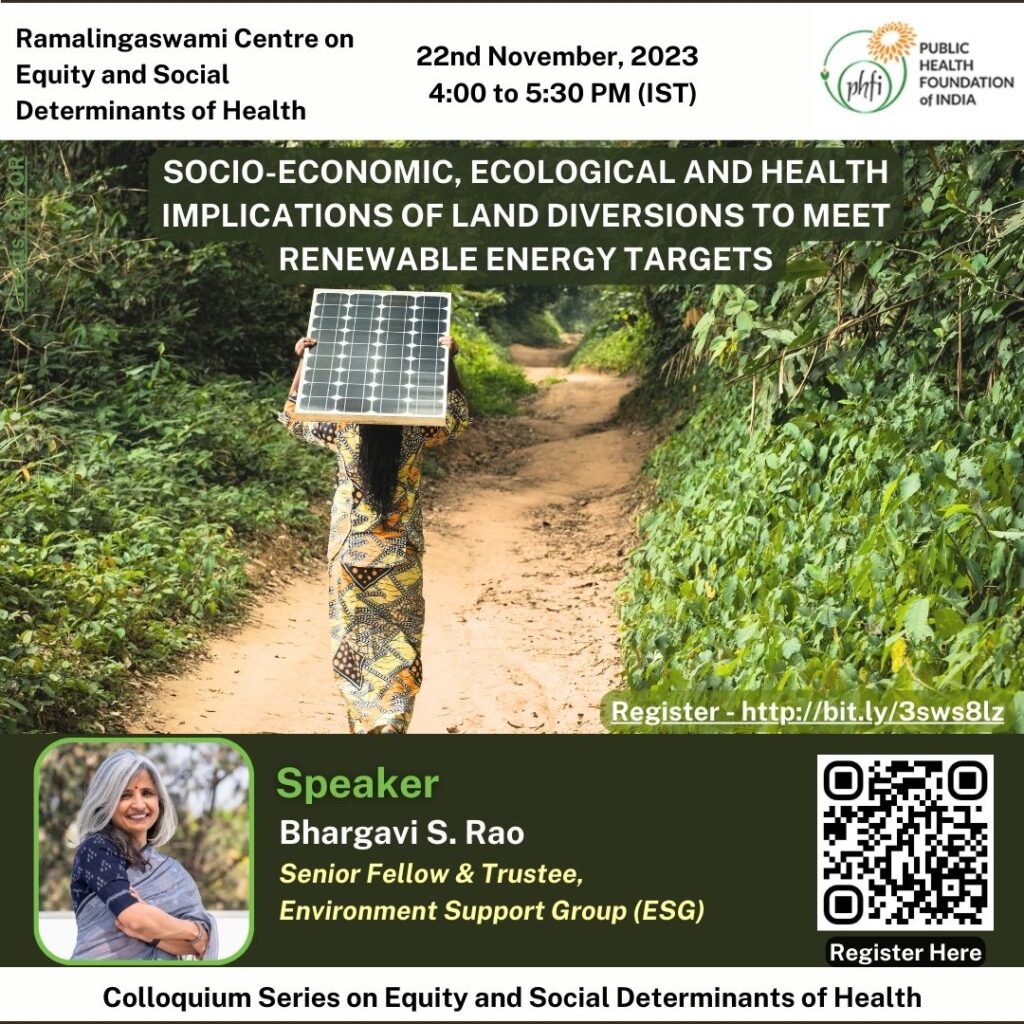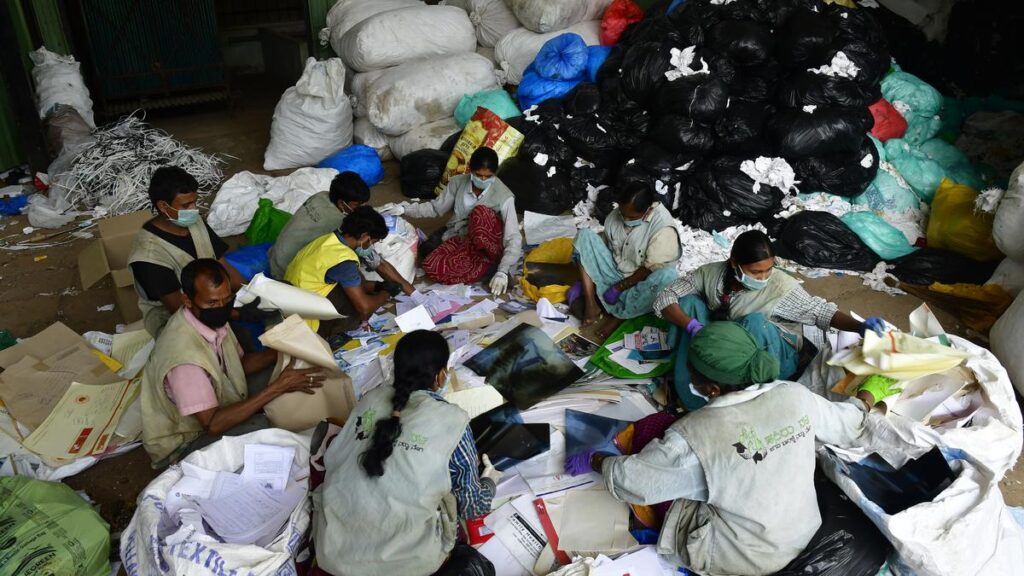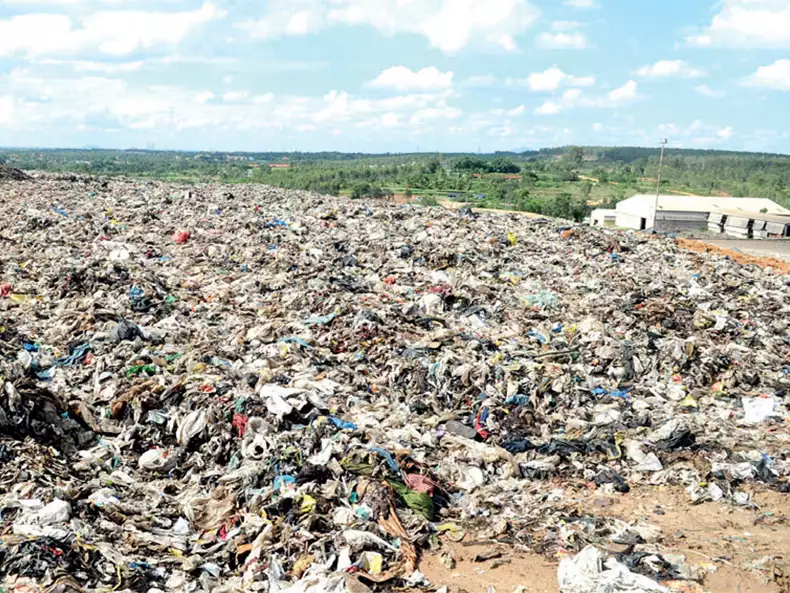Environment Justice Matters Vol. 4 Issue 16

Upcoming Events
The Ramalingaswami Centre, PHFI, is conducting a monthly Colloquium Series on 22nd November, 2023 from 4 pm to 5.30 pm. Register for the talk here or scan the QR code in the poster.
Bhargavi Rao, Senior Fellow & Trustee, Environment Support Group, will speak on Socio-economic, Ecological and Health Implications of Land Diversions to meet Renewable Energy Targets. She will examine how the reckless diversion of agro-pastoral and common lands to renewable energy projects disturbs the unique ecological landscapes and destroys eco-system dependent livelihoods, with serious implications for the nutritional security and health of local communities.

A Decentralised Climate Action Plan for Bengaluru
A report released by the Energy Policy Institute at Chicago (EPIC) shows that out of the 50 most polluted cities in the world, 39 are in India. This data only highlights the need for policy shifts to ensure better and more liveable futures, especially in urban areas.
In Bangalore, climate change and rapid urbanisation have led to heat island effects, increased rainfall, and flooding. To efficiently tackle these climate impacts in the city, the Environment Support Group is in the process of creating a decentralised and socially inclusive climate action plan that will incorporate the perspectives of not just academicians and top officials but also marginalised communities and the wider public. Watch out for more updates about the project on our website and in the upcoming issues of EJM!
A Giant Leap Backwards for Bengaluru’s Waste Management System

The Bengaluru Solid Waste Management Limited (BSWML), a company set up by the BBMP whose constitutional validity is currently being challenged before the Karnataka High Court (WP 13891/2021), is the parastatal responsibility for managing the city’s waste. However, recent actions of the BSWML only demonstrate bad planning & implementation.
BSWML has registered for Extended Producer Responsibility (EPR) with the Central Pollution Control Board, under which the company can now impose fees on companies for processing plastic and e-waste. However, no measures seem to be taken to advocate for overall reduction in the use of unnecessary plastics as highlighted by ESG in its memo submitted to the Court.
In a shocking move that can potentially set back waste management efforts by decades, BSWML has invited tenders to establish new landfills at four sites around Bangalore and for bio-mining at the Mavallipura landfill, at the cost of over INR 142 crore. This is despite multiple court orders on instituting decentralised waste management systems. Further, court orders as old as 2014 to scientifically manage legacy waste through biomining are yet to be implemented.

Existing landfills at Mavallipura, Mandur, and Chikkamangala have caused massive destruction to the environment and the health of those living in their vicinity. Read more about the Mavallipura landfill and its health impacts in ESG’s 2010 and 2018 reports.
BSWML is also mulling over charging a user fee for waste collection. However, the proposal to calculate the user fee based on electricity usage and collect the fee through BESCOM has raised concerns. While charging a user fee is envisaged under the SWM Rules, there is much left to do to ensure basic waste segregation at source.
Plastic Pollution Treaty in the Making

The third session of the Intergovernmental Negotiating Committee on Plastic Pollution (INC3) has commenced in Nairobi to discuss the framing of an international plastic treaty. Ahead of these negotiations, an interim report, Towards Eliminating Plastic Pollution by 2040: A Policy Scenario Analysis, finds that in 2022, 21 million tons (MT) of plastics leaked into the environment globally.
In a concerting revelation, environmental experts have raised alarms about the potential hazards associated with the use of paper straws containing persistent pollutants known as PFAS.
Recent Studies on Climate Change Impacts
Several recent reports showcase the grim future posed by climate change. The 8th annual report of the Lancet Countdown on Health and Climate Change reveals that if temperatures rise by 2°C (over pre-industrial levels) by the end of the century, then yearly heat-related deaths are projected to increase 370% by mid-century deaths may increase fivefold.
A ground-breaking report by the World Wide Fund for Nature (WWF) warns that VietNam’s Mekong Delta may run out of sand by 2035 due to excessive sand mining, which will further exacerbate the climate crisis. Wrap’s Textile 2030 Annual Report shows that although there has been a reduction in emissions and water usage by the textile and fashion industries, it is negated by the larger increase in the volume of textiles produced and sold.
More devastatingly, a United Nations-backed report that studied 20 major fossil fuel-producing nations, reveals that nation plan to keep increasing coal production until 2030 and oil and gas production beyond that, indicating that the world is on track to produce 110% more oil, gas, and coal through 2030 than is permissible under the Paris Agreement.
Coastal Communities Threatened by the Rising Sea
Island nations facing rising sea levels stand among the most vulnerable to climate change. A new study published in the journal Nature reveals that these northern Greenland ice shelves have lost 35% of their volume since 1978, equivalent to roughly 400 billion tons of floating ice, which will accelerate sea level rise.

Another study published in the journal Nature Communications has found that over the past 4 decades, the oceans, which absorb 90% of the excess heat from emissions, are producing stronger waves, which in turn generate seismic waves that are powerful enough to be detected on seismographs. The study reflects increasingly stormy seas and higher ocean swells.
Can we Solve the Climate Crisis?
Much has been written about climate change mitigation, and some of the solutions often presented rely heavily on altering nature using technology. However, this climate system that has been in the making for over 200 years cannot be fixed easily and is further complicated by technology that is indeterminate in proficiency, especially systems like carbon capture and storage. Another ‘solution’ to the climate crisis has been solar geoengineering, which has the potential to further exacerbate the climate impacts and even be misused.

White hydrogen has recently been at the forefront of the energy transition to mitigate climate change triggered by the discovery of vast deposits of white hydrogen. However, concerns have been raised over whether the energy from white hydrogen is really clean. In India, the Ministry of Environment, Forest and Climate Change (MoEFCC) launched the Green Credit Programme to combat climate change and reduce emissions by promoting sustainability through rainwater harvesting and tree plantations. However, alarm bells have been raised by environmentalists, as such systems can lead to greenwashing and the reduction of forests to fungible assets. A new paper in Oxford Open Climate Change indicates that to efficiently mitigate climate change, we need to adopt strategies beyond greenhouse gas reduction.
Agenda of the COP28
One of the key items on the agenda of the COP28, which is set to take place at the end of this month, is to operationalise the Loss and Damage Fund, which is the culmination of decades of pressure from climate-vulnerable developing countries. However, there are several concerns over the World Bank initially hosting the fund, given the high influence of developed countries in the institute and the high charges.
Another key consideration at the COP28 is sustainable food and energy security, with an entire day dedicated to analysing food systems in the context of carbon emissions and the impact of climate change. More importantly, no climate change negotiation can take place without discussing the intersection of climate change and gender. A recent paper assessing food and energy system linkages claimed that food production, transportation, and storage are responsible for at least 15% of fossil fuel emissions, and recommended weaning off fossil fuels from the food system. Another key issue at the conference will be that of water, coping with rising sea levels, floods, and droughts.
Monsanto’s Round-up Continues to Strike
As of October 2019, 42,700 plaintiffs had sued Monsanto, now Bayer, for cancer caused by Monsanto’s glyphosate herbicides. In 2020, Bayer settled over 100,000 roundup lawsuits, costing them over USD 10 billion. In yet another such case, a California jury awarded USD 332 million to a man who sued Monsanto Co. contending that his cancer was related to decades of using its Roundup weedkiller. Despite these cases, Bayer continues to promote the use of chemicals and GMOs and has shockingly stated that African agriculture ‘needs’ more European influence, a statement that has been severely criticised by IFOAM-Organics International.
Many countries are moving towards chemical free agriculture. Hungary’s Agriculture Minister has taken a firm stand on building a GMO-free agriculture, and insists that unknown technologies should not endanger society.
Pakistan also has recently tightened rules for the import of GMOs and set up a committee to mitigate the biosecurity, biosafety, and food security risks associated with GMO soybean seed imports in Pakistan.
Delhi – A Suffocating Capital
In early November, India’s capital, New Delhi, was blanketed by a thick layer of toxic haze, and the air quality index (AQI) reached about 480, the worst level for any major city in the world. The Supreme Court of India has also imposed a nationwide ban on firecrackers, extending restrictions on barium and banned chemicals to all states. While stubble burning may be one of the causes of the severely polluted city, it contributes to only 6% of the pollution. Further, the post-monsoon climate worsens the pollution problem due to a lack of rainfall that washes out pollution.

As a solution, the government has proposed cloud seeding; however, its environmental impact is still debated. The grave situation has also prompted enforcement authorities to take action against builders carrying out construction activities despite the ban, burning of garbage, use of coal etc.
Conservation Triumphs Across the Globe
Cambridgeshire’s Great Fen scheme promises a significant impact on biodiversity, while in the Sundarbans, collaborative efforts have led to a resurgence of Bengal tigers, securing their habitat and prey.
Simultaneously, the Galápagos Islands witness a transformation as dedicated conservation restores the giant tortoise population, offering hope for these iconic species and their ecosystem.
[Disclaimer: Environment Justice Matters (EJM) is provided for informational purposes only. It is not intended for commercial use, and Environment Support Group (ESG) does not derive any profit from its dissemination. We make no warranties or guarantees regarding the accuracy, completeness, or suitability of the information provided. Readers are encouraged to verify any information independently before relying on it. ESG shall not be held liable for any errors in the content, or for any actions taken in reliance thereon. All photographs used in EJM are sourced from the internet.]
[This issue of EJM was compiled by Asma, Sudha Nair , Yashaswini Sundar & Nidhi Hanji]
Environment Support Group (Trust) 1572, 36th Cross, Ring Road,
Banashankari II Stage Bangalore 560070, INDIA
Tel: 91 80 26713560 | Voice/Fax: 91 80 26713316
Website: esgindia.org | Email: [email protected]
- ESG is registered to secure support under the Corporate Social Responsibility (CSR) scheme of the Ministry of Corporate Affairs. Reg No. -CSR00017320
- Environment Support Group (ESG) is eligible to receive foreign donations/grants per the Foreign Contribution Regulation Act (FCRA)
- All donations to ESG from Indians are eligible for tax exemptions as per Sec. 80G of the Income Tax Act.
- More details about ESG’s Financial Reports and Statutory Approvals are accessible here: https://esgindia.org/new/financials and statutory clearances/
Your Monetary Contributions Keep Us Working
Visit our Support Page here.
CONTRIBUTIONS FROM INDIANS/DOMESTIC DONORS
(QR code is for Indian Donors only)
Bank details given below:
SB Account Number: 0-4-0-9-2-0-1-0-0-3-7-1-5-1
Account Name: Environment Support Group
Bank Name: Canara Bank
IFS Code: CNRB0010409
Bank Branch: Jayanagar 3rd Block
Bank Address: 69, 9th Main, 3rd Block, Jayanagar, Bangalore 560011
Post donation, please share name, address and donation details to [email protected]
along with PAN – statutory requirement.
CONTRIBUTIONS FROM FOREIGNERS/FOREIGN ORGANISATIONS
Account Number: 40113324601 (FCRA SAVINGS ACCOUNT)
Account Name: Environment Support Group
Branch Code: 00691
IFSC: SBIN0000691
SWIFT: SBININBB104
Bank Address: FCRA Cell, 4th Floor, State Bank of India, Sansad Marg, New Delhi Main Branch, New Delhi-110001
Post donation, please share name, address and donation details to [email protected].

